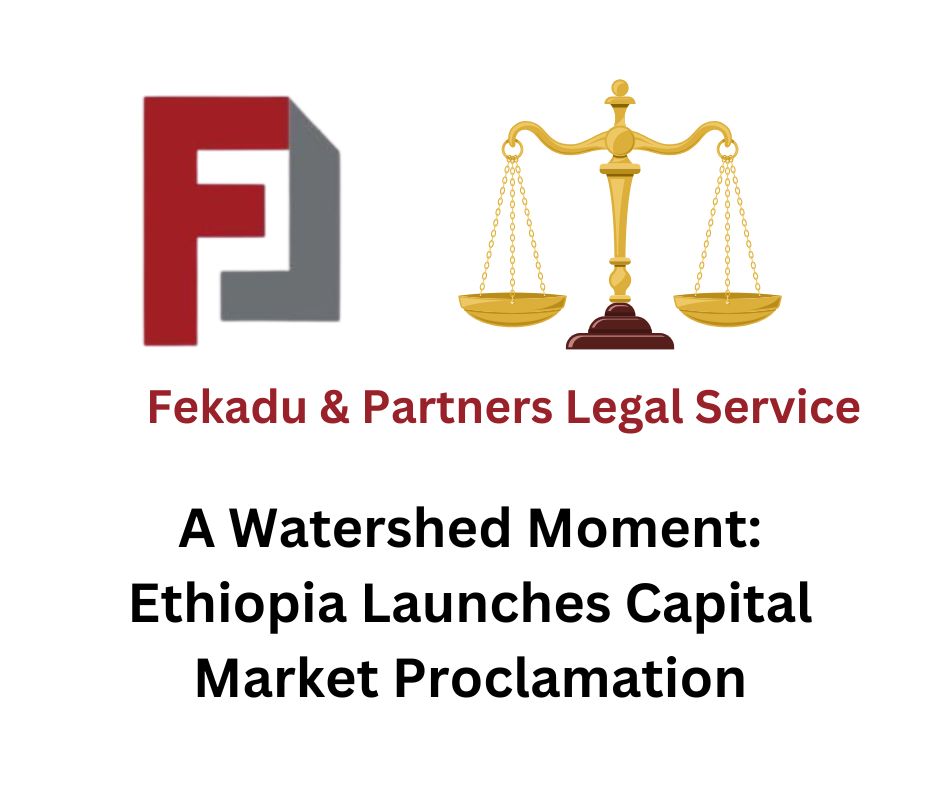By: Fekadu Petros | Published: June 14, 2021
On June 10, 2021, Ethiopia reached a historic milestone in its financial sector. The country’s parliament approved the much-anticipated Capital Market Proclamation, laying the groundwork for a fully regulated capital market ecosystem for the first time in its history.
This transformative law not only establishes the Capital Market Authority, but also introduces a wide range of market players, instruments, and regulatory mechanisms aimed at protecting investors and enhancing market transparency.
Let’s take a closer look at the key highlights of this game-changing proclamation.
Setting the Stage: What the Proclamation Covers
The new law is comprehensive, spanning multiple chapters and detailing everything from institutions and roles to prohibited practices and penalties. Its scope includes:
- Market regulators and actors
- Capital market products
- Rules, procedures, and institutions
- Offences, penalties, and dispute resolution mechanisms
At its core, the proclamation aims to build a robust and credible capital market infrastructure in Ethiopia.
The Capital Market Authority: Regulator-in-Chief
At the heart of the new ecosystem is the Capital Market Authority (CMA)—an autonomous public body accountable to the Prime Minister. It will be overseen by a seven-member board, including representatives from the National Bank of Ethiopia (NBE) and the Accounting and Auditing Board of Ethiopia (AABE).
The Authority’s key roles include:
- Licensing and supervising market participants
- Approving tradable financial products
- Issuing directives and monitoring compliance
- Coordinating with domestic and international bodies
- Protecting investors and ensuring market integrity
Key Market Players Introduced
To function effectively, a capital market needs more than just regulation—it needs a diverse ecosystem of participants. The proclamation introduces the following actors:
1. Securities Exchange
A central platform where securities are traded, the exchange will operate as a share company, ideally through a public-private partnership. It will also serve as a self-regulatory organization (SRO), overseeing the conduct of its members.
2. Securities Depository and Clearing Company
This institution ensures the clearing, settlement, and custody of securities. It manages the Central Securities Depository (CSD) and Clearing Counterparty (CCP) to facilitate seamless post-trade processes.
3. Investment Banks
Defined as non-deposit-taking institutions, investment banks will help raise capital, underwrite securities, and facilitate mergers and acquisitions. There are no nationality restrictions, allowing foreign banks to participate.
4. Brokers and Analysts
Brokers act as intermediaries for investors, enabling access to the exchange. Analysts provide critical market insights. Both groups will be regulated through directives from the Authority and Ethiopia’s Commercial Code.
5. Collective Investment Scheme (CIS) Operators
These include mutual funds, hedge funds, and other group investment vehicles. Though relatively new in Ethiopia, CISs have great potential to democratize investing.
6. Credit Rating Agencies
These institutions assess the creditworthiness of securities and issuers, providing vital information to investors. Foreign agencies may also participate without restriction.
Capital Market Tribunal: Independent Appeals Body
The proclamation also creates the Capital Market Tribunal (CMT) to hear appeals from CMA decisions and other regulatory bodies. Comprised of five members appointed by the Prime Minister, the tribunal ensures independent oversight and fair resolution of disputes.
Self-Regulation in the Capital Market
Recognizing the complexity of financial markets, the proclamation introduces Self-Regulatory Organizations (SROs). These include the Securities Exchange and Depository, as well as potential associations formed by brokers and dealers. SROs will create and enforce codes of conduct for their members, helping to maintain investor trust and ethical practices.
Products Covered by the Proclamation
The law defines a broad array of capital market instruments, including:
- Securities: Shares, bonds, debentures, asset-backed securities
- Derivatives: Futures, options, swaps
- Collective Investment Units
- Over-the-Counter (OTC) Instruments: Repos, securities lending, etc.
This wide scope enables innovation while providing a legal framework for oversight.
Safeguards: Prohibited Practices and Penalties
To protect investors and market integrity, the proclamation prohibits practices such as:
- Insider trading
- Market manipulation
- False trading
- Fraudulent transactions
- Front running and misleading statements
Penalties range from fines of ETB 100,000 to ETB 1,000,000 and prison terms of up to 15 years, reflecting the seriousness of such offences.
Other Key Areas Regulated
The proclamation also addresses:
- Public offerings and disclosures
- Takeovers and minority shareholder protection
- Compensation funds for investor protection
- Management of collective investment schemes
These are tailored rules specifically for capital markets, supplementing Ethiopia’s broader company law.
Dispute Resolution: Arbitration for Market Participants
While regulatory disputes go to the Capital Market Tribunal, contractual disputes among market participants are directed to arbitration. Although default is rare due to the exchange and clearing house structure, arbitration ensures a reliable resolution path when needed.
A New Era for Ethiopia’s Financial Sector
The introduction of the Capital Market Proclamation marks a turning point in Ethiopia’s economic modernization. It sets the stage for a functional and transparent capital market, enabling companies to raise capital efficiently and allowing investors to diversify their portfolios.
As implementation begins, the success of Ethiopia’s capital market will depend on sustained commitment, institutional capacity, and investor confidence. But one thing is clear: a new chapter in Ethiopian finance has just begun.
Have thoughts or questions about Ethiopia’s capital market journey? Share your comments below or subscribe to stay updated on financial reforms shaping the country’s future.

